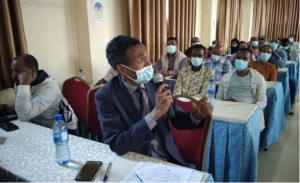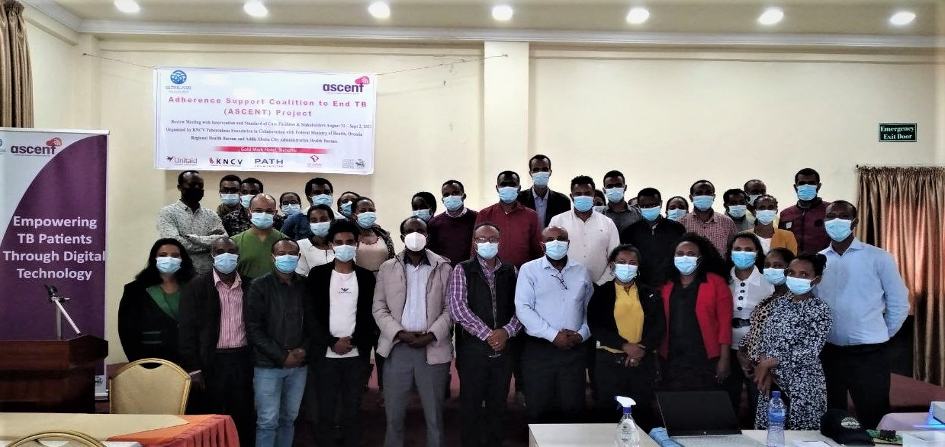ASCENT Ethiopia conducted a one-day review meeting in Bishoftu town Gold Mark Hotel for better implementation of the project. The Unitaid funded, KNCV Tuberculosis Foundation led ASCENT project aims to improve tuberculosis (TB) patient treatment outcomes by the use of digital adherence technologies (DATs). By reviewing the ongoing project, the ASCENT team aims to further improve the assistance they provide for people taking TB treatment.
The meeting, hosted by the ASCENT team, was attended by representatives from Federal Ministry of Health, National TB program, Oromia Regional Health Bureau, Addis Ababa City Administration Health Bureau, key stakeholders, St Peter Hospital, Alert Hospital, EPHI, AHRI, CDC, CCM, Reach Ethiopia, ETBE, CSOs (Organic Health Care and Volunteer Health Service), Community Advisory Board (Chairman and secretary), study facilities TB focal persons and facility heads from 78 intervention and standard of care facilities. The KNCV Tuberculosis Foundation Country representative also participated.
Topics of conversation
During the meeting, a variety of topics were discussed. Major implementation challenges related to the DATs and study were identified. These challenges include staff turnover at a TB clinic, shortage of separate lockable file cabinets to store study and DAT materials at TB clinics, and poor telephone network quality at some study areas.

Key partners, study implementing regional health bureaus (RHBs), health facilities heads and TB focal persons also reflected on the use of DATs. They noted that the demand of DATs at study implementing TB clinics is raising; ineligible patients are asking for use of DATs. At the same time, the morning queue at TB clinics is shortening and the burden on TB focal persons is decreasing, which makes it easier to provide differentiated care for patients.
Kitaw Teklemariam, Executive Director of Organic Health Care and survivor of TB, recalls what his TB treatment looked like. Every morning he had to go to the TB clinic, and hassle with transport, the queue at the clinic, the stigma, the economic burden and more discomforts. He wonders, ‘What if I was TB patient of today?’
Besides that, scale-up issues were discussed and facility focal persons were able to share their experience. That way, we were able to create a common understanding on the status of project activities amongst participants of the meeting.
Follow-up
As a conclusion of this meeting, several action points emerged. Such as:
- the training of additional health care workers to fill the gap of trained staff turnover;
- availing lockable file cabinets at study facilities;
- improving case detection of health facilities by strengthening detection in Cough OPD and the community TB activity in collaboration with partners like REACH Ethiopia LON project;
- and proceeding to support and monitor implementation of project activities very closely.
To monitor the progress of these follow-up action points and overall project activity, the participants recommended to conduct biannual review meeting. This way, ASCENT continues to look for the best way to support TB patients in their treatment adherence and reduce the suffering from TB as much as possible.
The Unitaid funded and supported ASCENT project is led by KNCV Tuberculosis Foundation in partnership with The Aurum Institute, London School of Hygiene & Tropical Medicine, and PATH.
